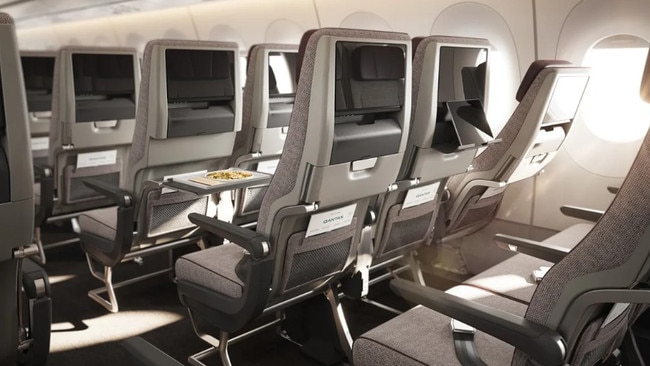Qantas boss confident customers will want to fly in economy on 20 hour plus flights
Qantas is undertaking research into how economy passengers will behave on 20 hour plus flights ahead of the launch of ultra long range Project Sunrise routes.
Business
Don't miss out on the headlines from Business. Followed categories will be added to My News.
Qantas is conducting research into how passengers will behave on 20 hour plus Project Sunrise flights, and remains confident of filling seats on A350-1000s even those in economy.
Slated to begin in the second half of 2026, the non-stop flights from Australia’s east coast to cities such as New York and London are expected to carry on the success of Qantas’ Perth-London and Perth-Rome routes.
Qantas CEO Vanessa Hudson said they were satisfied they weren’t going to see “tipping points” for passengers in economy, based on behaviours on those routes.
But in the interests of certainty, Qantas had teamed up with the Charles Perkins Institute to examine the best way to keep customers happy throughout the marathon flight.
“We’re doing lots of study around how do you optimise your time on a long flight, when do you eat, when do you hydrate and I think we’re at the forefront of really thinking about that long haul travel,” said Ms Hudson.
“It doesn’t surprise me (that people are willing to travel that far in an economy seat) because I think with entertainment now, with Wi-Fi and our seats will have extra pitch so it’s not going to be the image of economy as you might expect.”
The distance between economy seats on Project Sunrise A350s will be 84cm or 33 inches, compared to 81cm (32 inches) on Boeing 787-9s and 78.7cm (31inches) on Qantas A380s.

In addition, Ms Hudson said there would be room to stretch in Qantas’s innovative “wellbeing zone” where passengers could follow specially curated guided movements on big screens.
“Passengers will also travel with the knowledge that when they land, they’re at their destination and these aircraft will come with better humidity, lower impact pressurisation, so it’s going to feel a lot different.”
She expected families would be the most likely to book economy seats on the Project Sunrise flights from Sydney to New York or London, from the second half of 2026.
“I remember when I travelled with my kids it was absolutely tortuous from my experience getting off at the midpoint when they were in the middle of sleep,” said Ms Hudson.
“If there was a long flight that was going straight there I would’ve loved that but that’s just me.”
With 238 seats in total, the Qantas A350-1000s will have the lowest seat count of any A350 in service, including six in first class, 52 in business and 40 in premium economy.
The 140 economy seats will be in a 3-3-3 configuration with 33.7cm seat back screens and USB ports for charging devices.
Twelve of the specially configured A350-1000s are on order from Airbus, along with another dozen for other international flights.
Ms Hudson said they would eventually replace A380s currently flying routes such as Sydney to London via Singapore, and US routes.
“When the A380s go (in the early 2030s) we will ultimately have a fleet of A350-1000s, Project Sunrise A350-1000s and 787s plus then we’ll have narrow bodies that have the capability of flying short haul international as well,” she said.
As more aircraft arrived, more overseas destinations would be added to the Qantas network with Ms Hudson suggesting Greece was on her radar as a “seasonal route” like Rome.
“Every other person I speak to is going to Greece but obviously when we have the aircraft, that’ll be the time when we make the decision whether it’s all year round or seasonal,” she said.
Until the arrival of the A350s in mid-2026, Qantas would have to make do with existing widebody aircraft including ageing A330s and A380s.
Two of the superjumbos were yet to return to flying since Covid due to the huge backlog of heavy maintenance checks in Abu Dhabi, and another two were currently out of action requiring some serious juggling of schedules by Qantas.
The new aircraft represented billions of dollars of investment by Qantas, and Ms Hudson said it was important they “continued to deliver strong (financial) results” because that gave them the ability to invest.
“Striking the right balance is what I think about all the time and when we do announce (our results) at the end of August, it’s just one result,” she said.
“We’ve got to keep our eye on the ball every day and that’s what is going to get us back to being great.”
Originally published as Qantas boss confident customers will want to fly in economy on 20 hour plus flights





